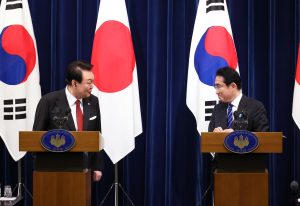Every year since 1990, the John F. Kennedy Library Foundation announces recipients of the “Profiles in Courage Award,” named after late President Kennedy’s Pulitzer Prize-winning book. The award is granted to individuals – mostly elected U.S. officials – who have demonstrated courage by pursuing the public good amid political risks and blowbacks.
This year, the foundation nominated two Asian leaders – Korean President Yoon Suk-yeol and Japanese Prime Minister Kishida Fumio – to receive a “Special International Profiles in Courage Award,” citing their leadership in thawing the Japan-South Korea relationship. In explaining the award, the foundation noted that “the leaders of South Korea and Japan have courageously worked to address sensitive historical issues that have prevented close cooperation.”
Their achievement in realizing a rapprochement on the governmental level has gained applause from the United States, which sees this convergence as an opportune moment to extract geopolitical gains. This view was also mirrored in the explanation from the JFK Library Foundation, which emphasized that the Japan-South Korea thaw had “set the stage for increasing trilateral cooperation with the United States.” The Japan-South Korea-U.S. trilateral framework is perceived to be a mechanism to respond to the threats imposed by China and North Korea.
While Yoon and Kishida shared the award, it seems that the South Korean president has been the one to actually demonstrate the type of courage that John F. Kennedy would have approved of.
In spite of opposition from 59 percent of the South Korean public, Yoon has persisted in a government-sponsored plan that would settle the forced labor issue, a thorny problem that had soured bilateral relations since 2018, when the Korean Supreme Court obliged Japanese companies to provide compensation for the wartime forced labor. Yoon has been insisting upon the need to build a forward-looking relationship with Japan and leave the historical problems aside, while the bulk of the public still yearns for a formal apology from Japan that recognizes the harm caused during the colonization of the Korean Peninsula from 1910 to 1945.
Yoon has initiated unpopular decisions regarding Japan, with the goal of realizing stability in the region and enhancing his country’s security. By contrast, Kishida seems to be the passive one in his exchanges with his Korean counterpart. The Japanese prime minister has risked little domestically so far.
In contrast to the Korean public, who reacted to their own government’s forced labor settlement with hostility, a majority of the Japanese public approved of the proposal. The reason for the positive reaction in Japan was obvious: Japanese companies’ role in providing compensation to the organization that supports forced labor victims was “voluntary.” That reinforced the impression to a significant portion of the Korean public that Japan had little or no sense of guilt over its past actions.
Kishida’s seeming inaction in the bilateral relationship is apparent when comparing him to his conservative predecessor, Abe Shinzo. The late Abe was accused of deteriorating Japan-South Korea relations to a historic low. He was an extremely unpopular figure in Korea due to his revisionist views on the “comfort women” – once asserting that the issue was non-existent. Yet ironically, Abe demonstrated more political courage in advancing Japan-South Korea ties than Kishida has done so far.
In 2015, Abe dispatched then-Foreign Minister Kishida to Seoul to make an announcement with the Korean foreign minister that both nations confirmed that the comfort women issue was “resolved finally and irreversibly.” In exchange, Kishida acknowledged the Japanese military’s responsibility in the comfort women issue and described it as a “grave affront to the honor and dignity of large numbers of women.” At the occasion, he also revealed that his government would provide donations to a Korean government backed organization established for helping the surviving comfort women.
The Japanese government’s admission of guilt on the comfort women issue caused backlash from Abe’s conservative followers, who believe in the infallibility of the Japanese military. According to a comment alleged to be from Abe, he said that his office was receiving “tons of emails” in opposition to his agreement with South Korea, which worried Abe personally at the time.
Ultimately the agreement of 2015 would be scrapped by the next South Korean government, but it was a moment where Abe himself risked certain political headwinds from his most reliable voting bloc. In an interview after he stepped down as prime minister, Abe admitted that he faced a dilemma between granting conservative wishes and realizing a diplomatic breakthrough during the controversy surrounding his decision in 2015. However, at the same time he defended his efforts by reiterating the need for erecting “one milestone at a time” in order to resolve historical issues in Northeast Asia, considering the highly politicized nature of history in the region.
If Kishida wants to help shift Japan-South Korea relations into a sustainably harmonious track, he should refer to Abe’s failed but constructive approach in order to materialize it. At this moment it seems that Yoon has been doing all of the heavy lifting in pursuit of a diplomatic thaw. However, if Japan and South Korea are going to engage in successful diplomacy, it should not be a one-way street; all stakeholders involved in the process ought to make concessions along the way.
For Kishida to be a part of complementing the rapprochement, at some point he will need to resist his conservative critics, despite being vulnerable to their attacks due to power dynamics within his party. By doing so, Kishida would truly become a worthy recipient of an award that commemorates courageousness.
































